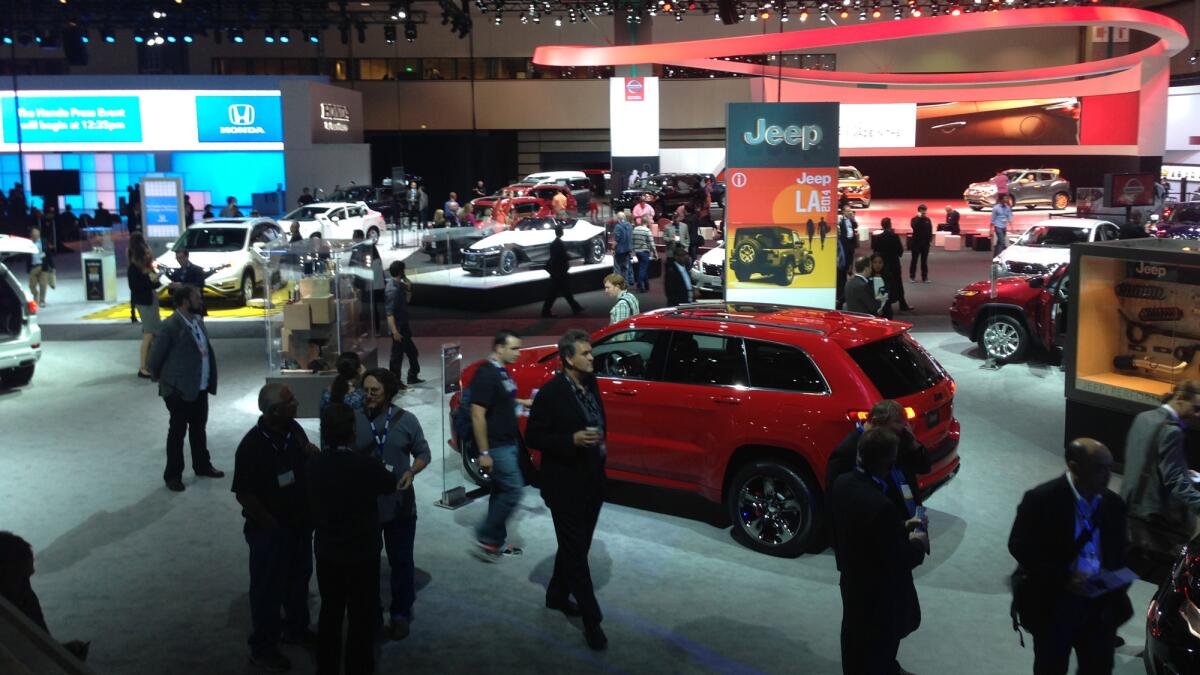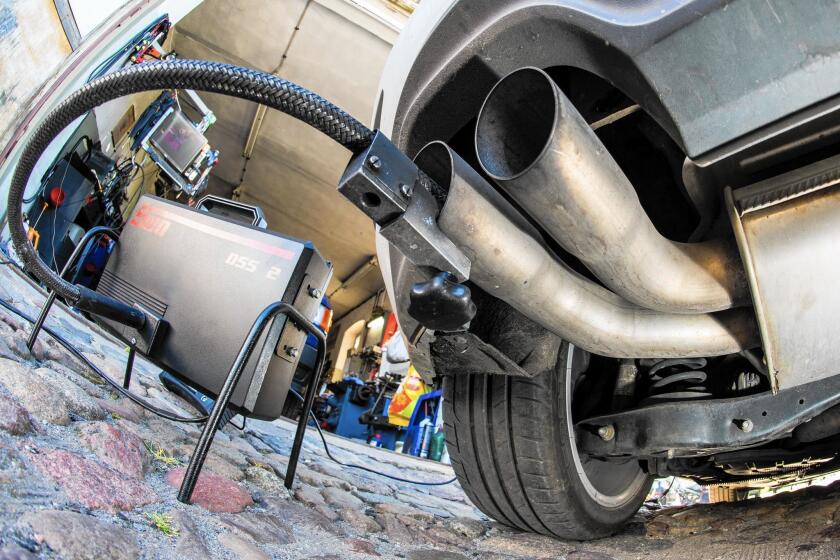California boycotts Trump-aligned automakers in escalating emissions fight

- Share via
California is using a new strategy — the boycott — to push back against automakers that have sided with the Trump administration in the battle over the state’s regulation of tailpipe emissions.
Last week, Gov. Gavin Newsom announced the state would stop buying vehicles from General Motors, Toyota, Fiat Chrysler and other automakers who have joined with Trump in seeking to strip the state’s authority to set its own greenhouse gas emission standards. On Wednesday, the California Air Resources Board said its board members and staff would cut ties with those Trump-aligned automakers in another way, by not attending the L.A. Auto Show for the first time in more than 50 years.
The decision to sit out the annual expo, which begins this week, was more than symbolic because it’s where automakers have traditionally unveiled “their most environmentally friendly cars and tried to position themselves as being very green,” Air Resources Board Chair Mary Nichols told reporters Wednesday.
“So it was important to me and to the governor that we sent the message that we’re not buying it this time,” Nichols said. “We’ve seen too much of talking out of both sides of their mouths coming from some of the larger companies and we simply can’t go along with it politely.”
The auto industry has been split in two by the fight between California and the Trump administration. The White House wants to weaken the nation’s fuel efficiency standards and take away California’s power to set its own, stricter greenhouse gas emission standards that are vital to reducing air pollution and fighting climate change.
California has joined other states in filing a second lawsuit against the administration for revoking the authority to regulate greenhouse gas emissions from automobiles.
The Coalition for Sustainable Automotive Regulation, an industry group that includes GM, Toyota and Fiat Chrysler, issued a statement on the boycott of the L.A. Auto Show, saying “we are disappointed in CARB’s decision to ignore the substantial investments from automakers to build a more robust future for electric vehicles,” and encouraging “all parties, including California, to come together to agree on one national program that includes year-over-year emissions reductions.”
Nichols said the state’s recent actions are in direct response to 15 automakers last month joining a lawsuit with the Trump administration seeking to prevent California from setting its own emissions standards. Earlier this year, California air regulators went around the Trump administration, secretly negotiating a deal with Ford, Honda, Volkswagen and BMW that rejects the federal government’s efforts to relax tailpipe pollution regulations in favor of gradually increasing fuel efficiency standards.
On Friday, Newsom’s administration announced it would prohibit state agencies from buying solely gas-powered sedans and only allow purchases from manufacturers that recognize the state’s authority to set its own pollution standards.
“Carmakers that have chosen to be on the wrong side of history will be on the losing end of California’s buying power,” Newsom said in a written statement.
There are more than 36,000 vehicles in California’s fleet, according to the state Department of General Services, and the state purchased 2,672 vehicles in 2018 —1,027 of them made by Chevrolet and 707 by Ford. For comparison, about 17 million cars, trucks and SUVs were sold in the United States last year.
In a statement, GM said it was “unfortunate” California would no longer consider purchasing its models, including electric vehicles that could help it meet its greenhouse gas emissions reduction goals.
“Removing vehicles like the Chevy Bolt and prohibiting GM and other manufacturers from consideration will dramatically reduce California’s choices for affordable, American-made electric vehicles and limit its ability to reach its goal of minimizing the state government’s carbon footprint, a goal that GM shares,” spokeswoman Jeannine Ginivan said.
Nichols said the decision to sit out the L.A. Auto show came out of related discussions about the state’s vehicle fleet purchases and the need to “recalibrate the relationship” with the car companies backing Trump.
She said the state declined invitations to meet and tour with auto executives that it received through Global Automakers, an industry group, and from individual car companies.
Nichols and other state officials have been participating in other, off-site events this week, including vehicle unveilings being hosted by Ford, Volkswagen and other companies that have cooperated with California. Despite the escalation in recent days, he said her agency remains in communication with the other, Trump-supporting automakers.
“We’re not pulling up the drawbridge to California here,” Nichols said, “but we are definitely sending the message that it’s not business as usual.”
More to Read
Sign up for Essential California
The most important California stories and recommendations in your inbox every morning.
You may occasionally receive promotional content from the Los Angeles Times.















